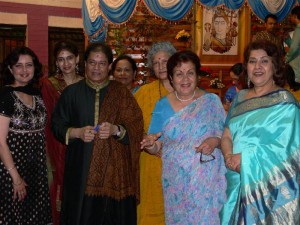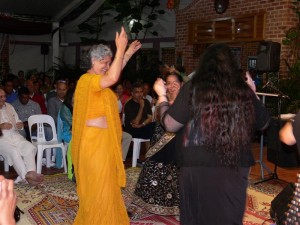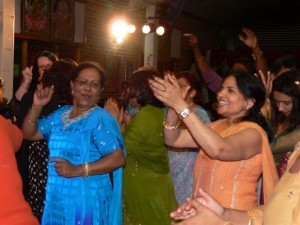Jalota’s bhajans a bliss for the soul
By Kumud Merani
He has a glimmer in his eye as his notes reach the heavens and shower down the on the sacred surrounds of the Muktigupteshwar Temple in Minto on November 28. He takes you through the forests of Vrindavan, then rocks you on the gentle waves of the Ganges and narrates tales from the treasure trove of Hindu mythology. The essence of natural incense pervades the precincts as the audience is transported on a melodious pilgrimage.
Anup Jalota is an artist blessed with the bounty by Mother Saraswati. He sings from his soul, inspired by a divine inspiration that the listeners find infectious and join into the chorus without inhibition.
Outside in the temple courtyard, he begins with Govind Bolo Hari Gopal Bolo replete with melodious intricacy. Another bhajan, Maiya Mori Main Nahin Maakhan Khayo by Surdas is unforgettable.
Anup Jalota relates to the audience the antics of Bal Krishna who gives explanation after explanation to His mother about not having stolen the Maakhan. As Krishna leaves for the forests early in the morning, the maestro uses Raag Bhairavi for the morning freshness and in the very next line as Krishna says he returns at dusk, Anup Jalota uses Raag Yaman Kalyan to create the ambience of nightfall.
When Yashoda asks her mischievous Krishna why he steals only Maakhan, He says because it has the words Maa in it. Most eyes well up on that doha, neither is my handkerchief dry. Finally as Bal Krishna admits to his mother that indeed He had stolen the Maakhan, the audience is enthralled.
Bhajans by Surdas, Kabir, Meera Bai rendered in Anup Jalota’s melodies, revive the memories of mythological tales of Ram and Krishna. Each Sur, Laya and Taal paints a perfect picture of the words of the Bhajan.
No less heart rending is the Ram Bhajan, “Kabhi Kabhi Bhagwan ko bhi Bhakton se Kaam Pade”. It gently unfolds the story of Lord Ram wanting to cross the river Ganga. The humble boat man Kevat is beside himself, filled with joy that he will ferry the God Himself. He washes Lord Ram’s feet on the excuse that if Bhagwan Ram’s foot touched his boat it might turn into a woman (an allusion to the story of Ahalya).
The most touching are the last lines (not included in the commercial CDs), when Kevat refuses to accept money for ferrying Lord Ram across, countering with the argument that the Lord, too, ferries everyone across universal ocean free.
In the end Anup ji brought everyone to their feet, all joining into a dance of sheer devotion to the heavenly melodies.
I can only conclude by quoting Meera Bai: “Paayo ji Maine Ram Ratan Dhan Payo”. Indeed “Kharche na khoote chor na loote”, the memories will remain with me for a long time.
Short URL: https://indiandownunder.com.au/?p=395



